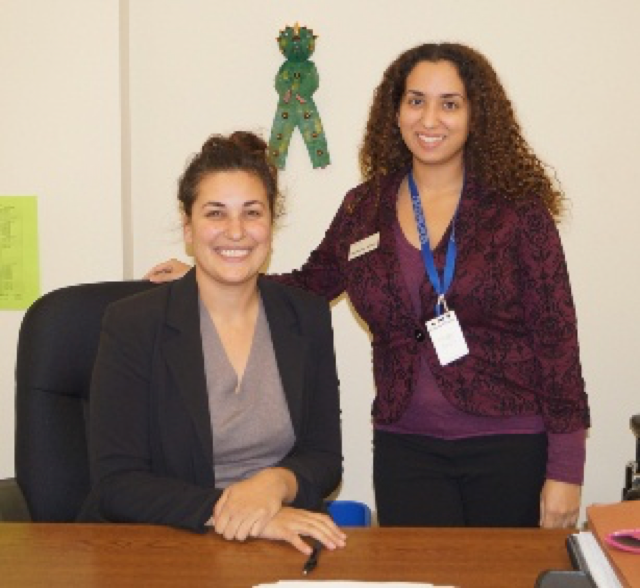In early October, Ada (not her real name) received the joyful news she had been hoping for: she had been granted asylee status in the United States. Her story, however, begins several years ago in her native country.
Now 32, Ada grew up in a village in rural Nigeria. When she was in her late 20s, she made the decision to tell her family that she was in a relationship with another woman, and her partner decided to do the same. Legally prohibited and scorned societally, the decision proved tragic.

Esperanza Center staff attorney Heather Benno and pro bono coordinator Ouranitsa Abbas
Her partner was publicly stoned to death on the streets of their village by both family members and other residents of the town. Ada suffered severe beatings and barely managed to escape with her own life; she fled to the capital city of Lagos just before she was to have been murdered herself. Alone and unsure what to do, an acquaintance introduced her to a travel agent who was able to obtain a tourist visa for her to travel to Mexico.
In late 2013, Ada flew to Tijuana, expecting to remain in Mexico. Instead, she was robbed of her passport, all of her documents and even her phone.
It was then that she decided to walk to the U.S. border, where she presented herself to a border patrol agent and asked for asylum in the United States. Taken immediately into custody, Ada was led away in handcuffs and taken to the first of two detention centers in which she would reside for several months. Eventually, she was released from detention and traveled to Baltimore to reunite with an uncle and several cousins already living in the area.
In the spring of 2014, Ada went to the Esperanza Center for a legal consultation. Working eventually with staff attorney, Heather Benno, and Esperanza pro bono coordinator, Ouranitsa Abbas, Ada began the long process of applying for asylum.
“The requirements for asylum can be extremely difficult for a new immigrant to prove,” said Heather. “Ada not only had to prove her sexual orientation but she also had to show how and why her family and her community threatened her life. She had to prove that conditions in Nigeria amount to a dangerous environment for other people in her situation and that the government is unable or unwilling to control this threat.”
Her case, like that of anyone seeking asylum, involved assembling documentation to prove her story. Having been robbed in Mexico of everything she brought with her, Ada had nothing in hand. She reached out to a friend still in Nigeria for help in obtaining the death certificate for her partner, but her friend wrote back in a letter that she feared for her own life if she even mentioned the deceased woman’s name in public. Though unable to provide the certificate, the letter was accepted by the courts as evidence of the life-threatening situation Ada would face if returned to Nigeria.
Ada also received both the physical and psychological evaluations that are required in asylee cases. The doctor confirmed that her scars and injuries – including permanent bruising and a gash on her leg from being cut with glass – were consistent with Ada’s descriptions of physical assault. The doctor also diagnosed Ada with post-traumatic stress disorder, or PTSD, demonstrating chronic fear and anxiety as a result of the ordeal she had experienced. Ada’s examinations, along with the letter from her friend in Nigeria, were both to prove crucial to her case.
On Monday, October 5, as Ada and attorney, Heather, were sitting in immigration court awaiting the judge’s decision on whether she would be deported, they received the news they had hoped to hear for more than a year – Ada’s request had been granted!
“This victory was only possible because of all of the work that went into it,” said Heather. “A year of preparation, client meetings, interviewing medical experts, research on the conditions in Nigeria and more. Like most asylees, Ada arrived in the United States seeking protection with almost nothing to prove what had happened to her. We worked with Ada to document the torture that she survived in Nigeria, why it happened and how it affects her to this day.”
After one year, she will be able to apply for permanent residency in the United States. Still living with family in Baltimore, Ada will now be able to find work and become self-sufficient. Today, she is able to live without the constant fear that has haunted her and focus on rebuilding her life.
“Ada showed remarkable strength, courage and determination fighting her case,” added Heather. “She showed the determination to withstand immigration detention, build a support network and find the Esperanza Center to represent her in fighting deportation.”
After winning her case, Ada sent a message thanking Heather and Ouranitsa and the entire staff of the Esperanza Center: “I wanted to express my gratitude for your efforts and dedication to my case. It was quite a long and upsetting process and I never thought anyone would stay by my side for this long, but you were very generous. It is really hard to make someone who doesn’t know you believe that you are innocent, but you still put all your efforts into getting my life back for me. Your faith, knowledge and determination were something that removed my worries. Thank you! God will bless you!”
